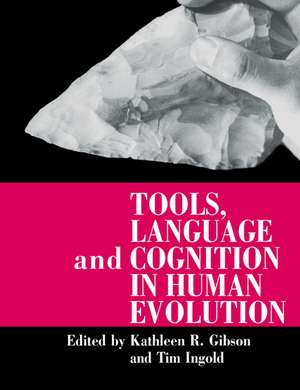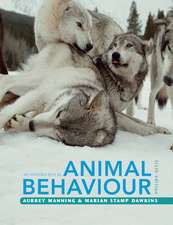Tools, Language and Cognition in Human Evolution
Autor Kathleen R. Gibson, Tim Ingolden Limba Engleză Paperback – 26 ian 1995
Preț: 706.45 lei
Preț vechi: 821.46 lei
-14% Nou
Puncte Express: 1060
Preț estimativ în valută:
135.22€ • 146.93$ • 113.66£
135.22€ • 146.93$ • 113.66£
Carte tipărită la comandă
Livrare economică 21 aprilie-05 mai
Preluare comenzi: 021 569.72.76
Specificații
ISBN-13: 9780521485418
ISBN-10: 052148541X
Pagini: 496
Ilustrații: 25 b/w illus. 14 tables
Dimensiuni: 175 x 248 x 24 mm
Greutate: 0.91 kg
Ediția:00003
Editura: Cambridge University Press
Colecția Cambridge University Press
Locul publicării:Cambridge, United Kingdom
ISBN-10: 052148541X
Pagini: 496
Ilustrații: 25 b/w illus. 14 tables
Dimensiuni: 175 x 248 x 24 mm
Greutate: 0.91 kg
Ediția:00003
Editura: Cambridge University Press
Colecția Cambridge University Press
Locul publicării:Cambridge, United Kingdom
Cuprins
Preface; Prologue: General introduction: Animal minds, human minds Kathleen Gibson; A history of speculation on the relation between tools and language Gordon Hewes; Part I. Word, Sign and Gesture: General introduction: Relations between visual-gestural and vocal-auditory modalities of communication Tim Ingold; 1. Human gesture Adam Kendon; 2. When does gesture become language? Susan Goldwin-Meadow; 3. The emergence of language Sue Savage-Rumbaugh and Duane Rumbaugh; 4. A comparative approach to language parallels Charles Snowdon; Part II. Technological Skills and Associated Social Behaviors of the Non-Human Primates: Introduction: Generative interplay between technical capacities, social relations, imitation and cognition Kathleen Gibson; 5. Capuchin monkeys Elisabetta Visalberghi; 6. The intelligent use of tools William McGrew; 7. Aspects of transmission of tool use in wild chimpanzees Christophe Boesch; Part III. Connecting Up The Brain: Introduction: Overlapping neural control of language, gesture and tool use Kathleen Gibson; 8. Disorders of language and tool use Daniel Kempler; 9. Sex differences in visuospatial skills Dean Falk; 10. The unitary hypothesis William H. Calvin; 11. Tool use, language and social behaviour in relationship to information processing capacities Kathleen Gibson; Part IV. Perspectives on Development: Introduction: Beyond neotony and recapitulation Kathleen Gibson; 12. Human language development and object manipulation Andrew Lock; 13. Comparative cognitive development Jonas Langer; 14. Higher intelligence, propositional language and culture as adaptations for planning Sue Parker and Constance Milbrath; Part V. Archaeological and Anthropological Perspectives: Introduction: Tools, techniques and technology Tim Ingold; 15. Early stone industries and inferences regarding language and cognition Nicholas Toth and Kathy Schick; 16. Tools and language in human evolution Iain Davidson and William Noble; 17. Layers of thinking in tool behaviour Thomas Wynn; 18. The complementation theory of language and tool use Peter Reynolds; 19. Tool-use, sociality and intelligence Tim Ingold; Epilogue: Technology, language, intelligence Tim Ingold; Index.
Recenzii
"...its subject matter is compelling, its presentation cogent, and its message important. For anyone with even a passing interest in the topic, the reward is worth the effort." Roger Lewin, New Scientist
"...a handsome, mind-stretching volume that expands human understanding among practitioners, and may serve as a useful supplementary text in college and universities." Philip R. Harris, Behavioral Science
"All 21 chapters in this book are well written and contain much interesting and at times challenging material." Charles Crawford, Contemporary Psychology
"While most chapters are written on a level appropriate for people from other fields, the breadth of coverage insures that experts in all relevant fields will find plenty of new food for thought. Consequently, this is a rather rare book in that it can be highly recommended for readers ranging from students to experts. All that is required is an interest in tools, language and human cognition, and this will surely be provoked by the book if not already present." Thomas R. Alley, Human Ethology Bulletin
"...a handsome, mind-stretching volume that expands human understanding among practitioners, and may serve as a useful supplementary text in college and universities." Philip R. Harris, Behavioral Science
"All 21 chapters in this book are well written and contain much interesting and at times challenging material." Charles Crawford, Contemporary Psychology
"While most chapters are written on a level appropriate for people from other fields, the breadth of coverage insures that experts in all relevant fields will find plenty of new food for thought. Consequently, this is a rather rare book in that it can be highly recommended for readers ranging from students to experts. All that is required is an interest in tools, language and human cognition, and this will surely be provoked by the book if not already present." Thomas R. Alley, Human Ethology Bulletin
Descriere
Looks at how humans have evolved complex behaviours such as language and culture.













